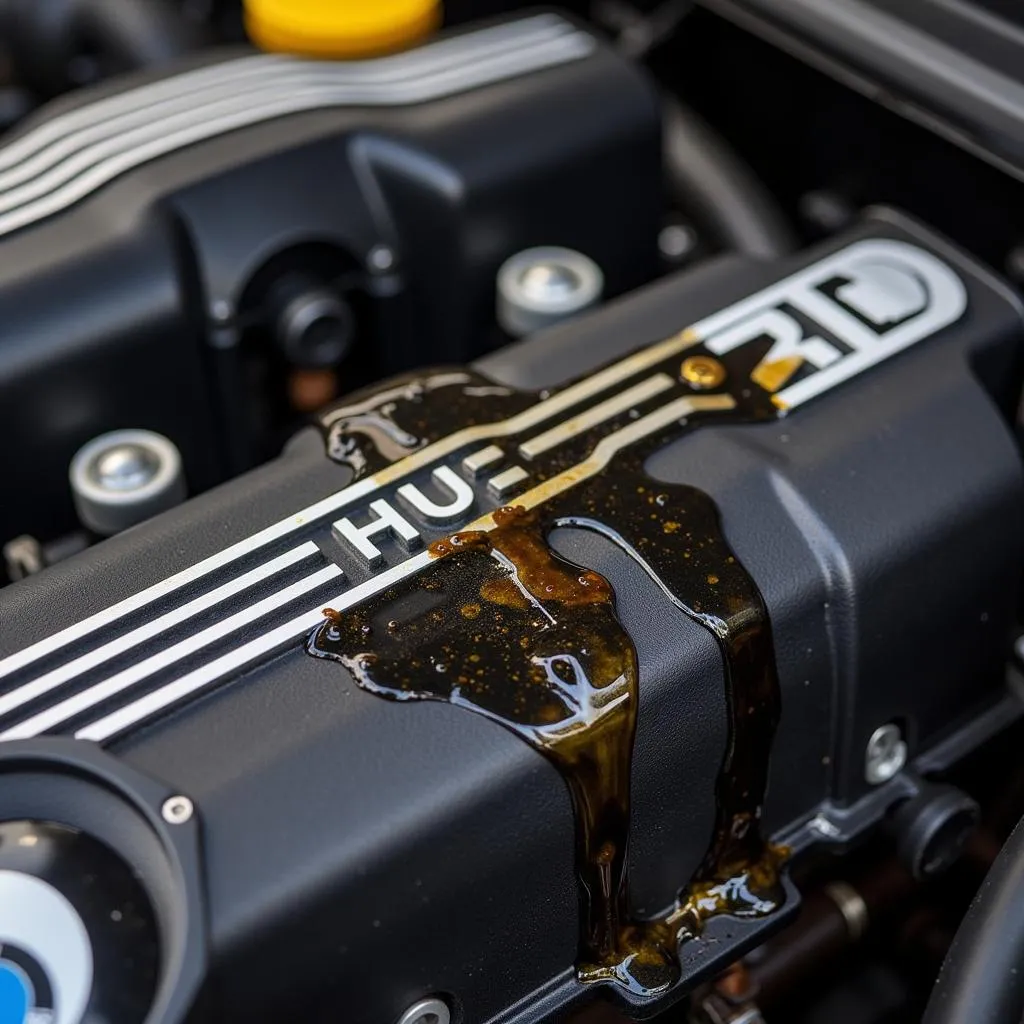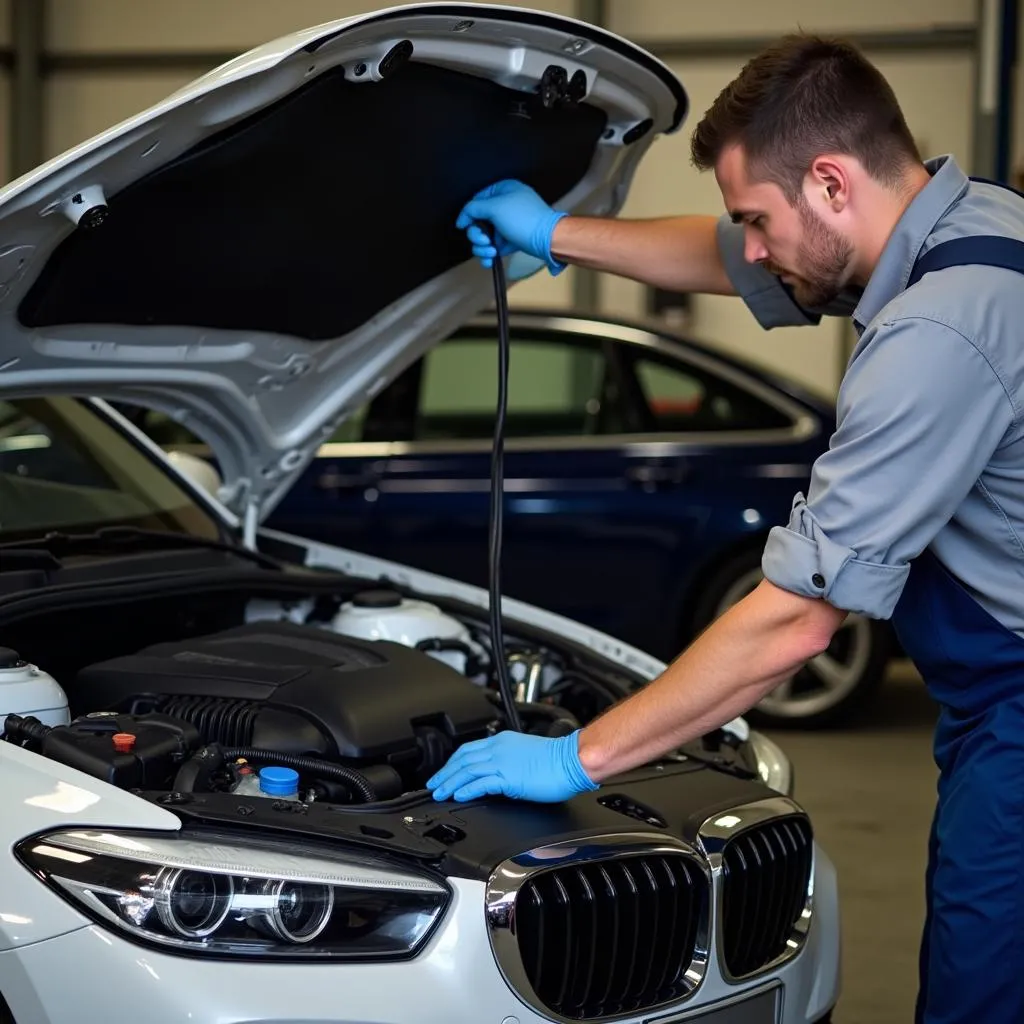BMW Leaking Oil: Causes, Solutions, and Prevention
A Bmw Leaking Oil is a common problem that can be caused by various factors. While it’s not uncommon for vehicles to experience minor oil leaks as they age, any sign of leakage from your BMW should never be ignored. Ignoring a seemingly small oil leak could lead to significant engine damage down the line, translating to hefty repair costs. This comprehensive guide explores the common causes of oil leaks in BMWs, potential solutions, and preventative measures to keep your BMW performing optimally.
Decoding the Dribble: Why is My BMW Leaking Oil?
Oil leaks in BMWs can originate from various sources, and pinpointing the exact culprit often requires a professional inspection. However, certain components are more susceptible to leaks than others. Let’s delve into some of the most common culprits behind BMW oil leaks:
- Worn-out Valve Cover Gaskets: The valve cover gasket seals the valve cover to the cylinder head, preventing oil leakage. Over time, this gasket can harden, crack, and lose its ability to seal, leading to oil seepage.
- Faulty Oil Filter Housing Gasket: Similar to the valve cover gasket, the oil filter housing gasket can deteriorate over time, causing oil to leak around the oil filter housing.
- Deteriorated Crankshaft Seal: Located at the front and rear of the engine, crankshaft seals prevent oil from escaping the crankshaft as it rotates. Worn crankshaft seals are a notorious source of leaks in aging BMWs.
- Damaged Oil Pan Gasket: The oil pan gasket seals the oil pan to the bottom of the engine block, preventing oil from leaking out. A damaged or degraded oil pan gasket can result in oil dripping from the bottom of the engine.
- Leaking Oil Cooler Lines: Some BMW models are equipped with an oil cooler system to regulate engine oil temperature. These systems have lines that can become brittle or develop cracks over time, leading to oil leaks.
 BMW Engine Oil Leak
BMW Engine Oil Leak
Recognizing the Signs: How to Tell if Your BMW is Leaking Oil
Identifying an oil leak early can save you from costly repairs down the line. Here are some telltale signs that your BMW might be leaking oil:
- Visible Oil Spots: The most apparent sign is oil spots on your garage floor or driveway. Fresh oil leaks typically appear as light brown or yellowish stains, while older leaks might look darker and dirtier.
- Burning Oil Smell: If you detect a persistent burning oil smell, especially after driving, it could indicate an oil leak. The leaking oil drips onto hot engine components, causing the burning smell.
- Low Oil Level: Regularly checking your BMW’s oil level is crucial. If you notice the oil level consistently dropping below the minimum mark on the dipstick, it’s a strong indicator of an oil leak.
- Engine Smoke: In more severe cases, a significant oil leak can cause smoke to emanate from the engine bay. This happens when a large amount of oil spills onto hot engine parts.
Addressing the Issue: What to Do if Your BMW is Leaking Oil
If you suspect your BMW is leaking oil, taking immediate action is critical. Here’s a step-by-step guide on what to do:
- Confirm the Leak: Carefully inspect the area where you suspect the leak. Look for oil stains, drips, or wet areas around engine components.
- Check the Oil Level: Use the dipstick to check your engine oil level. If it’s low, add enough oil to reach the minimum mark. This will buy you some time until you can get the leak addressed.
- Consult a Professional: Take your BMW to a qualified mechanic specializing in BMW repairs. They have the expertise and tools to accurately diagnose the source of the leak and recommend the appropriate repair.
 Mechanic Inspecting BMW Engine for Oil Leak
Mechanic Inspecting BMW Engine for Oil Leak
Repairing the Leak: Fixing the Problem at its Core
The repair method for a BMW oil leak hinges on the severity and location of the leak. Here are some common repair approaches:
- Gasket Replacement: Replacing worn-out gaskets, such as the valve cover gasket, oil filter housing gasket, or oil pan gasket, is a common repair for oil leaks.
- Seal Replacement: Replacing leaking seals, such as the crankshaft seal or camshaft seal, involves accessing the seal behind various engine components and replacing it with a new one.
- Line Repair or Replacement: If a leaking oil cooler line or other oil lines are the culprit, repairing or replacing the affected line is necessary.
- Component Replacement: In some instances, replacing entire components like the oil cooler or oil pan might be more cost-effective than repairing individual parts.
Preventing Future Leaks: Proactive Measures for a Leak-Free BMW
While some oil leaks are unavoidable due to wear and tear, proactive maintenance can significantly reduce the risk of encountering them. Here are some preventative measures:
- Regular Oil Changes: Adhering to your BMW’s recommended oil change intervals, as outlined in your owner’s manual, is crucial. Fresh oil contains the necessary additives to lubricate engine parts effectively and prevent premature wear on seals and gaskets.
- Using High-Quality Oil: Using high-quality synthetic oil that meets BMW’s specifications ensures optimal lubrication and reduces stress on seals and gaskets.
- Inspecting for Leaks Regularly: Incorporating a visual inspection of your BMW’s engine bay for signs of oil leaks into your routine maintenance can help catch leaks early on.
- Addressing Leaks Promptly: As tempting as it might be to ignore a minor oil leak, addressing it promptly prevents further damage and potentially more expensive repairs in the future.
 BMW Oil Change Service
BMW Oil Change Service
Conclusion
Addressing a BMW leaking oil promptly is crucial to prevent further engine damage and expensive repairs. By understanding the common causes, recognizing the signs, and taking proactive measures, you can keep your BMW running smoothly for years to come. Remember, regular maintenance and timely repairs are key to enjoying the exhilarating performance and reliability that BMWs are renowned for.
Frequently Asked Questions about BMW Oil Leaks
Q1: How much does it cost to fix a BMW oil leak?
The cost of repairing a BMW oil leak varies greatly depending on the source and severity of the leak. A simple gasket replacement could cost a few hundred dollars, while a more complex repair involving engine component replacement could cost a few thousand dollars.
Q2: Can I drive my BMW with an oil leak?
While driving short distances with a minor oil leak might be possible, it’s highly discouraged. Continuing to drive with an oil leak can lead to severe engine damage, resulting in costly repairs.
Q3: How often should I check my BMW’s oil level?
It’s generally recommended to check your BMW’s oil level at least once a month or before long trips. Regularly monitoring your oil level helps detect leaks early on and ensures your engine is adequately lubricated.
Q4: Are oil leaks covered under BMW warranty?
Whether an oil leak is covered under your BMW warranty depends on your vehicle’s age, mileage, and the specific terms and conditions of your warranty.
Q5: Can I fix a BMW oil leak myself?
While some DIY enthusiasts might have the skills to tackle minor oil leak repairs, it’s generally recommended to leave such repairs to qualified mechanics specializing in BMWs. They possess the expertise and tools to ensure a proper and safe repair.
You might also be interested in:
Need Help? Contact Us!
For any assistance with your BMW, feel free to contact us via WhatsApp: +1(641)206-8880, Email: [email protected] Or visit our address: 276 Reock St, City of Orange, NJ 07050, United States. Our dedicated customer support team is available 24/7 to assist you.
